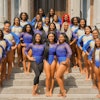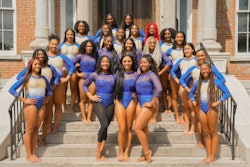Brienne Minor is a tennis player at the University of Michigan. She recently won the NCAA Division I women’s singles championship.
By the way, she is Black. Like a lot of people, you don’t associate an African-American woman with winning the NCAA singles title.
That’s OK because it has never been done before until last month when she defeated Belinda Woolcock from Florida, 6-3, 6-3.
Only one other Black person has ever won an NCAA Division I singles title and that is Arthur Ashe. He won the singles title in 1965 while a student at UCLA.
The numbers of African Americans playing college tennis are dismal at best. Less than 5 percent of African American women make up college tennis ranks. The number is a little higher if you include women who attend historically Black colleges and universities. For African American men, it is about 3 percent. When you include HBCUs, it is a tad higher.
Nonetheless, these numbers are paltry and may stay that way for the foreseeable future. Why don’t Black kids play tennis? Some would say they are too busy playing basketball and football. Others would say it’s too expensive while many would say it is the lack of role models in the sport.
I believe all three reasons have merit. African-American children are almost overwhelmed with basketball and football players who look like them. Television and playing venues across America provide them with an appropriate stage.
The NBA Finals, for example, were recently completed and the stars were pretty much all Black. Football is no different.
So, a young boy or girl of color sees these images and it is almost a natural progression for them to want to go to the NBA or the WNBA with Candace Parker and Tina Charles. Recently, Dawn Staley, a former WNBA star, won the NCAA Division I women’s basketball championship as the coach of the University of South Carolina.
There is an expense tied to playing tennis, especially if you want to excel at the sport. When you add up buying tennis balls, tennis rackets, tennis shoes and court time that adds up to a chunk of change.
That chunk of change is what a lot of African-American youth just don’t have. You also have to factor in the expense for lessons, travel and tournament fees. Of course, you still are not likely to make it to the professional ranks. That is just a fact of life.
You see Serena and Venus on television but there are many Black kids who just weren’t good enough. Of course, that is the refrain for all sports, you just weren’t good enough.
There aren’t a lot of Black community role models for kids who want to play tennis. The United States Tennis Association (USTA) and 100 Black Men of America, Inc., developed an alliance in 2009 to increase the participation of African Americans in the game of tennis. Since that time, many cities like Atlanta and New Orleans have developed tennis programs for African-American youth. These initiatives will pay dividends but they will take time.
That is why what Brienne Minor did is so remarkable. She, along with her two sisters, Kristina and Jasmine competed in USTA Junior tournaments. Seeing other African-American youth at these tournaments was a rarity. They thought about the Williams sisters and that they could be just like them. Brienne said, “We were serious.”
The Minor parents certainly played a role in their development. “Know who you are. Be proud of who you are,” Kevin Minor said. “Some things you might ignore, but other things you have to speak out about.”
Tennis is both an individual and a team sport. It is an individual sport in that it is you against the other person. As you are playing, it is about your own will power, your own athleticism and your own ability to influence the outcome. It is also a team sport as you want to give the very best for your team to win team championships.
Brienne Minor is 19 years old and will be returning to school in the fall. Her story is unfolding before our eyes. Will she enter the ranks of professional tennis as Ashe did years ago? The tennis world is watching.
However, for now, let’s congratulate Brienne Minor on this achievement. She is an NCAA champion.
Dr. James B. Ewers Jr., served as a vice president and admissions director at several colleges and universities before retiring in 2012. A motivational speaker and workshop leader, he is the author of Perspectives From Where I Sit: Essays on Education, Parenting and Teen Issues.



















